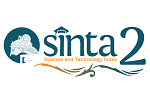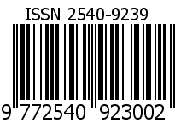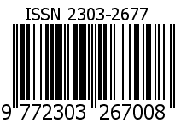Information and Electronic Transactions Law effects on Malang City people's information-sharing behavior
Abstract
In this era, Indonesian society is transitioning to an information society, where technological advances are supported by developments in science, causing a shift in society’s patterns of accessing and disseminating information. The Internet and social media in Indonesia have the potential to expand the public sphere and domains that involve citizens openly. The existence of the Internet and social media public sphere is seen as a space for digital activism, which is a creative means for people to share information and a means to build information democracy by sharing information. Thus, the government's role is to regulate and maintain information order through laws or regulations. This study aimed to evaluate the impact of the Information and Electronic Transactions Law Number 19 of the Year 2016 (Undang-Undang Informasi dan Transaksi Elektronik) on the information-sharing behavior of Malang City’s people on social media. The research method used was correlational with a quantitative approach. Data collection techniques were used on a survey of 350 randomly selected samples. The data analysis used correlational statistical analysis. This study showed that laws and regulations influenced information-sharing behavior on social media in Malang City regarding information and electronic transactions. In conclusion, sharing information with the people of Malang City makes the Information and Electronic Transactions Law a binding legal rule. The remaining research results will be presented in this study.
Keywords
References
Alami, A. N., Luong, D. N. A., Prihatini, E., Ramadhani, E., Go, J. R. R., Hafidzah, N., & Atiyah, U. (2023). Democratization in the digital era: Experience from Southeast Asia. JAS (Journal of ASEAN Studies), 10(2), 227−246. https://doi.org/10.21512/jas.v10i2.9361
Anagusti, T. T., Ayuningtyas, F., & Venus, A. (2024). Crisis communication strategy in the digital era at the Ministry of Finance of the Republic of Indonesia’s Directorate General of Taxes. Jurnal Riset Komunikasi, 7(1), 1–14. https://doi.org/10.38194/jurkom.v7i1.914
Atisa, G., Zemrani, A., & Weiss, M. (2021). Decentralized governments: Local empowerment and sustainable development challenges in Africa. Environment, Development and Sustainability, 23(3), 3349–3367. https://doi.org/10.1007/s10668-020-00722-0
Bernal, P. (2016). Data gathering, surveillance and human rights: Recasting the debate. Journal of Cyber Policy, 1(2), 243–264. https://doi.org/10.1080/23738871.2016.1228990
Buchanan, T. (2020). Why do people spread false information online? The effects of message and viewer characteristics on self-reported likelihood of sharing social media disinformation. PLOS ONE, 15(10), e0239666. https://doi.org/10.1371/journal.pone.0239666
Candea, M., Wright, F., Fedirko, T., & Heywood, P. (2021). Freedom of speech. Cambridge Encyclopedia of Anthropology, 1–18. https://doi.org/10.29164/21speech
Chekmenyova, Gennadievna, T., Ershov, Anatolyevich, B., Trubitsyn, Dmitrievich, S., Ostapenko, & Alekseevich, A. (2020). China's information security strategy: Political and technical aspects. Bulletin Socia-Econmic and Humanitarian Res, 7(9), 78–97. https://doi.org/10.5281/zenodo.3911320
De Paor, S., & Heravi, B. (2020). Information literacy and fake news: How the field of librarianship can help combat the epidemic of fake news. The Journal of Academic Librarianship, 46(5), 102218. https://doi.org/10.1016/j.acalib.2020.102218
Drigas, A., & Karyotaki, M. (2019). Attention and its role: Theories and models. International Journal of Emerging Technologies in Learning (IJET), 14(12), 169–182. https://doi.org/10.3991/ijet.v14i12.10185
Farangiz, H. (2023). Clarification of the definition of the term “concept.” International Journal of Recently Scientific Researcher’s Theory, 1(3), 174–176. https://uzresearchers.com/index.php/ijrs/article/view/582/533
Gstrein, O. J. (2020). Mapping power and jurisdiction on the internet through the lens of government-led surveillance. Internet Policy Review, 9(3), 1–17. https://doi.org/10.14763/2020.3.1497
Hendrawan, M. R., & Mukhlis. (2021). Pengantar pengorganisasian dan temu balik informasi: Pendekatan, konsep, dan praktik (1st ed.). Universitas Brawijaya Press.
Heterharie, J. ., Surachman, (A.S), H., & A., P. (2019). SOR (Stimulus-Organism-Response) model application in observing the influence of impulsive buying on consumers post-purchase regret. International Journal of Scientific and Technology Research, 8(11), 2829–2841. https://www.ijstr.org/final-print/nov2019/Sor-stimulus-organism-response-Model-Application-In-Observing-The-Influence-Of-Impulsive-Buying-On-Consumers-Post-purchase-Regret.pdf
Hidayat, M. A., & Aditya, L. (2021). Polisi di Malang upayakan jalan damai untuk perkara terkait UU ITE. Viva.Co.Id. https://www.viva.co.id/berita/nasional/1351505-polisi-di-malang-upayakan-jalan-damai-untuk-perkara-terkait-uu-ite
Hou, Z., Du, F., Jiang, H., Zhou, X., & Lin, L. (2020). Assessment of public attention, risk perception, emotional and behavioural responses to the COVID-19 outbreak: Social media surveillance in China. MedRxiv. https://doi.org/10.1101/2020.03.14.20035956
Huvila, I. (2022). Making and taking information. Journal of the Association for Information Science and Technology, 73(4), 528–541. https://doi.org/10.1002/asi.24599
Islam, A. K. M. N., Laato, S., Talukder, S., & Sutinen, E. (2020). Misinformation sharing and social media fatigue during COVID-19: An affordance and cognitive load perspective. Technological Forecasting and Social Change, 159(12201), 120201. https://doi.org/10.1016/j.techfore.2020.120201
Jaeger, P. T., & Burnett, G. (2005). Information access and exchange among small worlds in a democratic society: The role of policy in shaping information behavior in the post‐9/11 United States. The Library Quarterly, 75(4), 464–495. https://doi.org/10.1086/502787
Jeong, Y., Kim, E., & Kim, S.-K. (2020). Understanding active sport tourist behaviors in small-scale sports events: Stimulus-Organism-Response approach. Sustainability, 12(19), 8192. https://doi.org/10.3390/su12198192
Keller, A. M., Taylor, H. A., & Brunyé, T. T. (2020). Uncertainty promotes information-seeking actions, but what information? Cognitive Research: Principles and Implications, 5(1), 42. https://doi.org/10.1186/s41235-020-00245-2
Kosmol, L. (2019). Sharing is caring - Information and knowledge in industrial symbiosis: A systematic review. 2019 IEEE 21st Conference on Business Informatics (CBI), 1, 21–30. https://doi.org/10.1109/CBI.2019.00010
Kosmol, T., Reimann, F., & Kaufmann, L. (2019). You’ll never walk alone: Why we need a supply chain practice view on digital procurement. Journal of Purchasing and Supply Management, 25(4), 100553. https://doi.org/10.1016/j.pursup.2019.100553
Kusnandar, V. B. (2023). Piramida penduduk Indonesia 2022, usia produktif mendominasi. Databoks. https://databoks.katadata.co.id/datapublish/2023/07/05/piramida-penduduk-indonesia-2022-usia-produktif-mendominasi
LP3ES. (2021). Isu-isu aktual, kontestasi parpol serta kandidat capres menuju 2024. LP3ES. https://www.lp3es.or.id/2021/05/13/isu-isu-aktual-kontestasi-parpol-serta-kandidat-capres-menuju-2024/
Lubin, A. (2020). Hacking for intelligence collection in the fight against terrorism: Israeli, comparative, and international perspectives. 13 HUKIM - The Israeli Journal on Legislation, 251–322. https://www.repository.law.indiana.edu/facpub/2984/
Lubis, P., Mardianto, & Nasution, M. I. P. (2023). Gerakan literasi sekolah: Tantangan literasi di era digital dan cara mengatasinya. Jurnal Media Infotama, 19(2), 487–496. https://doi.org/10.37676/jmi.v19i2.4399
Mare, A. (2020). State-ordered internet shutdowns and digital authoritarianism in Zimbabwe. International Journal of Communication, 14, 4244–4263. https://ijoc.org/index.php/ijoc/article/view/11494/3184
Matassi, M., Mitchelstein, E., & Boczkowski, P. (2022). Social media repertoires: Social structure and platform use. The Information Society, 38(2), 133–146. https://doi.org/10.1080/01972243.2022.2028208
Meilisa, H. (2021). PGRI Jatim angkat bicara soal vonis bebas dosen Malang dari jeratan UU ITE. Detiknews. https://news.detik.com/berita-jawa-timur/d-5507677/pgri-jatim-angkat-bicara-soal-vonis-bebas-dosen-malang-dari-jeratan-uu-ite
Neyazi, T. A., Kuru, O., & Mukerjee, S. (2024). The influence of sexism and incivility in Whatsapp political discussions on affective polarization: Evidence from a 2022 multi-party election in India. The International Journal of Press/Politics. https://doi.org/10.1177/19401612241242431
Obrenovic, B., Jianguo, D., Tsoy, D., Obrenovic, S., Khan, M. A. S., & Anwar, F. (2020). The enjoyment of knowledge sharing: Impact of altruism on tacit knowledge-sharing behavior. Frontiers in Psychology, 11. https://doi.org/10.3389/fpsyg.2020.01496
Pemerintah Kota Malang. (2021). Profil Kota Malang smart city. Smartcity.Malangkota.Go.Id. https://smartcity.malangkota.go.id/tentang
Pengadilan Negeri Malang. (2022). Putusan PN Malang ITE. Direktori Putusan Mahkamah Agung Republik Indonesia. https://putusan3.mahkamahagung.go.id/direktori/index/pengadilan/pn-malang/kategori/ite-1.html
Placek, M. (2020). Learning democracy digitally? The internet and knowledge of democracy in nondemocracies. Taylor and Francis Online, 27(8), 1413–1435. https://doi.org/10.1080/13510347.2020.1795640
Pusparisa, Y. (2022). Masyarakat paling banyak mengakses informasi dari media sosial. Databoks. https://databoks.katadata.co.id/datapublish/2020/11/23/masyarakat-paling-banyak-mengakses-informasi-dari-media-sosial
Ricknell, E. (2020). Freedom of expression and alternatives for internet governance: Prospects and pitfalls. Media and Communication, 8(4), 110–120. https://doi.org/10.17645/mac.v8i4.3299
Roetzel, P. G. (2019). Information overload in the information age: A review of the literature from business administration, business psychology, and related disciplines with a bibliometric approach and framework development. Business Research, 12(2), 479–522. https://doi.org/10.1007/s40685-018-0069-z
Rojszczak, M. (2021). Surveillance, legal restraints and dismantling democracy: Lessons from Poland. Democracy and Security, 17(1), 1–29. https://doi.org/10.1080/17419166.2020.1841367
Rossini, P., Stromer-Galley, J., Baptista, E. A., & Veiga de Oliveira, V. (2021). Dysfunctional information sharing on WhatsApp and Facebook: The role of political talk, cross-cutting exposure and social corrections. New Media and Society, 23(8), 2430–2451. https://doi.org/10.1177/1461444820928059
Savolainen, R. (2017). Information sharing and knowledge sharing as communicative activities. Information Research, 22(3). https://files.eric.ed.gov/fulltext/EJ1156371.pdf
Singh, P., Dwivedi, Y. K., Kahlon, K. S., Sawhney, R. S., Alalwan, A. A., & Rana, N. P. (2019). Smart monitoring and controlling of government policies using social media and cloud computing. Information Systems Frontiers, 22(2), 315–337. https://doi.org/10.1007/s10796-019-09916-y
Sofwan, E., Sopiyana, M., & Fathurrahman, A. M. (2022). The application of the right to freedom of expression in demonstration based on principles of a democratic state. Jurnal Civics: Media Kajian Kewarganegaraan, 19(2), 310–319. https://doi.org/10.21831/jc.v19i2.53464
Soroya, S. H., Farooq, A., Mahmood, K., Isoaho, J., & Zara, S. (2021). From information seeking to information avoidance: Understanding the health information behavior during a global health crisis. Information Processing & Management, 58(2), 102440. https://doi.org/10.1016/j.ipm.2020.102440
Statista. (2021). Breakdown of social media users by age and gender in Indonesia as of January 2021. Statista.Com. https://www.statista.com/statistics/997297/indonesia-breakdown-social-media-users-age-gender/
Stewart, E., & Hartmann, D. (2020). The new structural transformation of the public sphere. American Sociological Association, 38(2), 170–191. https://www.jstor.org/stable/26953576
Sugiyono. (2019). Metode penelitian kuantitatif, kualitatif dan R&D. Alfabeta.
Sulistyo-Basuki, Putu, L., & Priyanto, I. F. (2018). Memetakan perkembangan ilmu perpustakaan & informasi di Indonesia. Ikatan Sarajan Ilmu Perpustakaan dan Informasi Indoneisa.
Sun, Y., & Xing, J. (2022). The impact of social media information sharing on the green purchase intention among Generation Z. Sustainability, 14(11), 6879. https://doi.org/10.3390/su14116879
Tai, Q. (2014). China’s media censorship: A Dynamic and diversified regime. Journal of East Asian Studies, 14(2), 185–209. https://doi.org/10.1017/s1598240800008900
Watt, E. (2017). ‘The right to privacy and the future of mass surveillance.’ International Journal of Human Rights, 21(7), 773–799. https://doi.org/10.1080/13642987.2017.1298091
Zolotarev, P. (2020). Security and development, the logic of interconnection. Russia and America in the 21st Century, 1(4). https://doi.org/10.18254/S207054760013336-6
DOI: https://doi.org/10.24198/jkip.v12i1.50187
Refbacks
- There are currently no refbacks.
Copyright (c) 2024 Author(s)

This work is licensed under a Creative Commons Attribution-ShareAlike 4.0 International License.
Jurnal Kajian Informasi & Perpustakaan Indexed by:
Jurnal Kajian Informasi & Perpustakaan
Program Studi Perpustakaan dan Sains Informasi d.h. Program Studi Ilmu Perpustakaan
Fakultas Ilmu Komunikasi, Universitas Padjadjaran
Jl. Raya Bandung-Sumedang Km. 21 Jatinangor, Sumedang, Indonesia 45363
WA: +62 813-1323-7581 (Chat Only)
Telepon: +62227796954
Faksimile: +62227794122
email: jkip.fikom@unpad.ac.id
Jurnal Kajian Informasi & Perpustakaan is licensed under a Creative Commons Attribution-ShareAlike 4.0 International License
Jurnal Kajian Informasi & Perpustakaan supervised by:












2.png)
.png)



